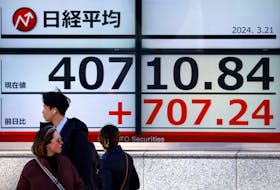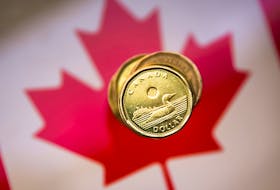By David Randall, Lewis Krauskopf and April Joyner
NEW YORK (Reuters) - World stock markets should fall further on Monday after a record contraction in China's manufacturing and service sectors because of the coronavirus outbreak, illustrating the massive potential economic impacts of the epidemic for the rest of the globe.
The outbreak has already caused massive disruptions in industry, led U.S. equities to suffer their worst weekly selloff since the financial crisis and knocked trillions off the market value of global stocks.
The first proper glimpse of how much economic damage the outbreak has inflicted so far came from China, the world's second-largest economy where the epidemic began.
China's official Purchasing Managers' Index (PMI), a widely-watched measure of economic activity, fell to a record low in February, data showed on Saturday, with a worrying collapse in domestic and export orders and a contraction of the country's burgeoning service sector.
Investors believe the next few days will reveal whether the outbreak is accelerating in the United States, the world's biggest economy, how much the U.S. government is prepared to deal with an epidemic, and the economic damage in other countries.
"Right now the market is saying that this is unbounded. We don't know what the limits are and we don't know where it's going to peak," said Graham Tanaka, chief investment officer at New York-based Tanaka Capital.
Stock markets globally lost about $5 trillion of value last week, as measured by the MSCI all-country index <.MIWD00000PUS> that comprises stocks across 23 developed and 26 emerging markets.
The S&P 500 <.SPX> shed 11% last week, entering correction territory, while the Dow <.DJI> and the Nasdaq <.IXIC> also registered their deepest weekly percentage losses since October 2008.
(GRAPHIC - Virus wipes out trillions off world stocks: https://fingfx.thomsonreuters.com/gfx/mkt/13/2546/2514/Pasted%20Image.jpg)
The February China PMI readings are the first snapshot of the economy's state since the start of the coronavirus outbreak that has killed almost 3,000 people in mainland China and infected about 80,000.
The data indicates the economic disruption from the virus could extend to the whole first quarter of 2020 since the outbreak has caused widespread transport curbs and required tough public health measures that have paralyzed economic activity.
Capital Economics estimates China's economy would contract outright in year-on-year terms this quarter, the first time since at least the 1990s.
"The worst China manufacturing PMI in history will shock the market on Monday," ING economists wrote.
"Covid-19 has not only stopped production but has also broken the supply chain of production,...." they said.
Investors are looking to the United States, where the outbreak and efforts to prepare for its possible spread have become political during a presidential election year.
The White House has played down the crisis and described the high level of news coverage as a ploy to hurt President Donald Trump's efforts to secure a second term.
"The next line in the sand is if we see cases expand in the U.S.," said Jack Janasiewicz, portfolio manager and strategist at Natixis Investment Managers Solutions.
Signs that Japan could cancel its 2020 Summer Olympics--after years of preparation and some $12 billion in investment--would be another unwelcome development, Janasiewicz said.
The International Olympic Committee has said it is committed to holding the Games on schedule.
Tanaka, of Tanaka Capital, said he is closely watching the U.S. response, including whether the government has been able to secure more kits to test for the virus.
He has trimmed his position in shares of Tesla Inc
Others are looking to the government bond market, a popular destination for nervous investors. Yields on the U.S. 10-year Treasury note, which move inversely to prices, hit an all-time low Friday.
(Reporting by David Randall, Lewis Krauskopf and April Joyner; Additional reporting by Vidya Ranganathan in Singapore; Editing by Daniel Wallis and Christian Schmollinger)









